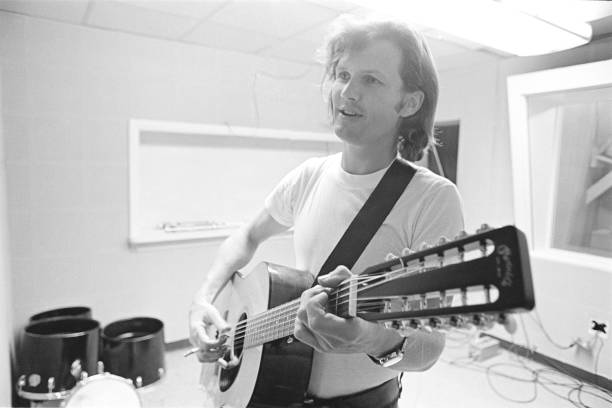 Introduction and Short Summary of the Song
Introduction and Short Summary of the Song
Released in 1971 on Kris Kristofferson’s second album The Silver Tongued Devil and I, “Breakdown (A Long Way from Home)” is one of his darker, more introspective songs. Written during a period when Kristofferson was moving from cult songwriter to established recording artist, the track captures the feelings of isolation, exhaustion, and emotional collapse that can come from drifting far from one’s roots. It is less of a polished narrative and more of a raw confession, set to Kristofferson’s trademark plainspoken delivery. While it was never a commercial single, the song deepens the album’s exploration of flawed characters and broken dreams, marking it as one of the most revealing pieces in his early catalog.
Origins of the Song
By the time Kristofferson recorded “Breakdown (A Long Way from Home),” he was already being hailed as one of America’s most important new songwriters. His first album had introduced classics like “Sunday Mornin’ Comin’ Down” and “Help Me Make It Through the Night,” and his material was being recorded by artists as diverse as Johnny Cash, Ray Price, and Janis Joplin. With his sophomore record, he delved deeper into themes of loneliness, addiction, and self-destruction.
---> Scroll down for the VIDEO
“Breakdown (A Long Way from Home)” was written solely by Kristofferson, reflecting his ability to distill his own struggles into universal terms. It was recorded in Nashville with producer Fred Foster, using a sparse arrangement that emphasized mood and lyricism over commercial polish.
Why Kris Kristofferson Released “Breakdown (A Long Way from Home)”
The song was not designed for radio play, but it fit perfectly into the emotional landscape of The Silver Tongued Devil and I. The album’s title track explored the seductive but destructive power of charisma, while other songs examined the costs of freedom and indulgence. “Breakdown” contributed to this theme by serving as a meditation on alienation and collapse—physical, emotional, or spiritual.
---> Scroll down for the VIDEO
Kristofferson was known for writing songs that felt more like confessions or short stories than hits, and “Breakdown” exemplified this approach. By including it, he reinforced his identity as a songwriter willing to explore uncomfortable truths rather than chase easy sentiment.
The Message Conveyed in the Song
At its core, “Breakdown (A Long Way from Home)” is about exhaustion, alienation, and the fragile state of someone who has strayed too far from familiarity or comfort. The lyrics evoke a sense of being lost both physically and emotionally, with the repeated refrain emphasizing distance not only from home but from stability and sanity.
Lines like these (paraphrased for clarity) suggest both confession and lament:
-
The narrator is worn down, weary of the road.
-
He longs for a sense of belonging but finds himself drifting further away.
-
The breakdown is not just physical but emotional—a surrender to loneliness.
Kristofferson’s delivery adds to the poignancy. His gravelly, world-weary voice makes the song feel authentic, as though he is speaking directly from his own experiences with alienation and self-doubt.
The Recording and Musical Characteristics
Musically, the track is stark and minimal, matching the bleakness of the lyrics.
-
Vocals: Kristofferson’s voice is raw and unpolished, but it carries deep emotion. His phrasing is conversational, emphasizing meaning over melody.
-
Instrumentation: Acoustic guitar dominates, supported by bass, light percussion, and subtle touches of organ or steel guitar. The arrangement is understated, avoiding dramatic flourishes.
-
Mood: Somber, weary, and confessional, the mood mirrors the breakdown described in the lyrics.
-
Style: A blend of folk, country, and singer-songwriter traditions, emphasizing storytelling and atmosphere.
The sparse production allows the listener to focus entirely on the words and the emotional weight behind them.
Cultural and Commercial Impact
Commercially, the song did not chart, as it was never released as a single. However, it contributed to the critical success of The Silver Tongued Devil and I, which cemented Kristofferson’s reputation as one of the finest songwriters of his generation. Critics praised the album for its honesty and literary quality, and “Breakdown” was part of that fabric.
Culturally, the song reflected the growing disillusionment of the early 1970s. Many Americans, particularly young listeners, were feeling alienated by the Vietnam War, political upheaval, and changing social norms. Kristofferson’s willingness to voice exhaustion and despair resonated with audiences who saw themselves in his weary confessions.
Legacy of “Breakdown (A Long Way from Home)”
Today, the song is remembered as a deep cut in Kristofferson’s catalog, treasured by fans who appreciate his darker, more introspective material. It may not have the commercial appeal of “Me and Bobby McGee” or the tenderness of “For the Good Times,” but it carries its own quiet power.
For Kristofferson’s legacy, the song underscores his identity as a songwriter who valued truth over polish. He was not afraid to admit weakness, loneliness, or weariness in his music, and that honesty helped define him as one of the most authentic voices of his era.
More broadly, “Breakdown (A Long Way from Home)” illustrates the strength of Kristofferson’s second album. It added depth and darkness to a record already filled with literary explorations of human flaws, ensuring that The Silver Tongued Devil and I was more than just a collection of hits—it was a coherent artistic statement.
More than fifty years later, the song continues to resonate with those who feel the alienation it describes. It stands as a reminder that Kristofferson’s greatest gift was not just writing catchy songs but capturing the deepest struggles of the human spirit with honesty and courage.